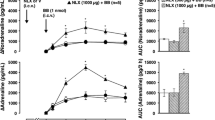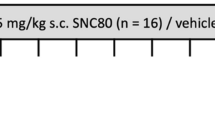Abstract
There is some evidence that delta-opioid receptors may be involved in the brain processes related to neuroprotection. The aim of the present studies was to test the hypothesis that endogenous opioid peptides acting via delta-opioid receptors can protect against stress-induced changes in factors related to brain plasticity and stress hormone release. Forty male adult Wistar rats were used. Half of the animals were exposed to sustained partial restraint stress (hypokinesis) lasting 48 h. Rats were treated with vehicle (isotonic saline) or the delta-opioid receptor antagonist naltrindole (3 mg/kg/ml, s.c.) six times a day. The stressfulness of the model was confirmed by increased plasma concentrations of corticosterone and prolactin, the increase in anxiety behavior in the open field test, as well as the reduction of BrdU incorporation into newly formed DNA in the hippocampus. Treatment with naltrindole potentiated the stress-induced rise in aldosterone concentrations. The blockade of delta-opioid receptors resulted in a decrease in hippocampal BDNF gene expression independently of control or stress conditions. Treatment with naltrindole enhanced plasma concentrations of copeptin, a stable precursor of vasopressin. In conclusion, these results suggest that endogenous opioid peptides might play an inhibitory role in aldosterone release under stress conditions and in the control of vasopressin release independently of stress exposure. Endogenous opioids might stimulate hippocampal gene expression of the important neurotrophic factor BDNF via delta-opioid receptors.





Similar content being viewed by others
Data Availability
The data that support the findings of this study are available from the corresponding author upon reasonable request.
References
Agorastos A, Sommer A, Heinig A, Wiedemann K, Demiralay C (2020) Vasopressin surrogate marker copeptin as a potential novel endocrine biomarker for antidepressant treatment response in major depression: a pilot study. Front Psychiatry 11:453. https://doi.org/10.3389/fpsyt.2020.00453
Andrews ZB, Grattan DR (2003) Opioid receptor subtypes involved in the regulation of prolactin secretion during pregnancy and lactation. J Neuroendocrinol 15(3):227–236. https://doi.org/10.1046/j.1365-2826.2003.00975.x
Babic S, Ondrejcakova M, Bakos J, Racekova E, Jezova D (2012) Cell proliferation in the hippocampus and in the heart is modified by exposure to repeated stress and treatment with memantine. J Psychiatr Res 46:526–532. https://doi.org/10.1016/j.jpsychires.2012.01.002
Babic S, Pokusa M, Danevova V, Ding ST, Jezova D (2015) Effects of atosiban on stress-related neuroendocrine factors. J Endocrinol 225(1):9–17. https://doi.org/10.1530/JOE-14-0560
Balagova L*, Graban J*, Puhova A*, Jezova D (2019) Opposite effects of voluntary physical exercise on β3-adrenergic receptors in the white and brown adipose tissue. Horm Metab Res 51(09): 608–617. https://doi.org/10.1055/a-0928-0758. *equally contributed
Buzgoova K, Graban J, Balagova L, Hlavacova N, Jezova D (2019) Brain derived neurotrophic factor expression and DNA methylation in response to subchronic valproic acid and/or aldosterone treatment. Croat Med J 60(2):71–77. https://doi.org/10.3325/cmj.2019.60.71
Chomanic P, Karailevova L, Graban J, Török B, Zelena D, Jezova D (2020) Effect of subchronic restraint and delta opioid receptor blockade on selected neuroendocrine factors in rats. In: Lukacova N, Galik J (ed) Proceedings of a conference of early career researchers in Slovakia, Kosice, pp 37–40
Degli Uberti EC, Petraglia F, Bondanelli M, Guo AL, Valentini A, Salvadori S, Criscuolo M, Nappi RE, Genazzani AR (1995) Involvement of mu-opioid receptors in the modulation of pituitary-adrenal axis in normal and stressed rats. J Endocrinol Invest 18(1):1–7. https://doi.org/10.1007/BF03349688
Dehelean L, Romosan AM, Papava I, Bredicean CA, Dumitrascu V, Ursoniu S, Romosan RS (2020) Prolactin response to antipsychotics: an inpatient study. PLoS ONE 15(2):e0228648. https://doi.org/10.1371/journal.pone.0228648
Dripps IJ, Jutkiewicz EM (2018) Delta opioid receptors and modulation of mood and emotion. Handb Exp Pharmacol 247:179–197. https://doi.org/10.1007/164_2017_42
Fernandez B, Antelo MT, Guaza C, Alberti I, Pinillos ML, Viveros MP (1999) Naltrindole administration during the preweanling period and manipulation affect adrenocortical reactivity in young rats. Brain Res Dev Brain Res 112(1):135–137. https://doi.org/10.1016/s0165-3806(98)00154-0
Fujii H, Uchida Y, Shibasaki M, Nishida M, Yoshioka T, Kobayashi R, Honjo A, Itoh K, Yamada D, Hirayama S, Saitoh A (2020) Discovery of δ opioid receptor full agonists lacking a basic nitrogen atom and their antidepressant-like effects. Bioorg Med Chem Lett 30(12):127176. https://doi.org/10.1016/j.bmcl.2020.127176
Graban J, Hlavacova N, Jezova D (2017) Increased gene expression of selected vesicular and glial glutamate transporters in the frontal cortex in rats exposed to voluntary wheel running. J Physiol Pharmacol 68(5):709–714
Guo M, Cao D, Zhu S, Fu G, Wu Q, Liang J, Cao M (2015) Chronic exposure to morphine decreases the expression of EAAT3 via opioid receptors in hippocampal neurons. Brain Res 1628(Pt A):40–49. https://doi.org/10.1016/j.brainres.2015.03.037
Haj-Mirzaian A, Nikbakhsh R, Ramezanzadeh K, Rezaee M, Amini-Khoei H, Haj-Mirzaian A, Ghesmati M, Afshari K, Haddadi NS, Dehpour AR (2019) Involvement of opioid system in behavioral despair induced by social isolation stress in mice. Biomed Pharmacother 109:938–944. https://doi.org/10.1016/j.biopha.2018.10.144
Hlavacova N, Jezova D (2008) Chronic treatment with the mineralocorticoid hormone aldosterone results in increased anxiety-like behavior. Horm Behav 54(1):90–97. https://doi.org/10.1016/j.yhbeh.2008.02.004
Iwasaki Y, Gaskill MB, Robertson GL (1994) The effect of selective opioid antagonists on vasopressin secretion in the rat. Endocrinology 134(1):55–62. https://doi.org/10.1210/endo.134.1.8275969
Izakova L, Hlavacova N, Segeda V, Kapsdorfer D, Morovicsova E, Jezova D (2020) Salivary aldosterone, cortisol and their morning to evening slopes in patients with depressive disorder and healthy subjects: acute episode and follow up six months after reaching remission. Neuroendocrinology. https://doi.org/10.1159/000505921.10.1159/000505921
Jezova D, Vigas M, Jurcovicová J (1982) ACTH and corticosterone response to naloxone and morphine in normal, hypophysectomized and dexamethasone-treated rats. Life Sci 31(4):307–314. https://doi.org/10.1016/0024-3205(82)90407-6
Jezova D, Balagova L, Chmelova M, Hlavacova N (2019) Classical steroids in a new fashion: focus on testosterone and aldosterone. Curr Protein Pept Sci 20(11):1112–1118. https://doi.org/10.2174/1389203720666190704151254
Karatas H, Yemisci M, Eren-Kocak E, Dalkara T (2018) Brain peptides for the treatment of neuropsychiatric disorders. Curr Pharm Des 24(33):3905–3917. https://doi.org/10.2174/1381612824666181112112309
Kitchen I, Pinker SR (1990) Antagonism of swim-stress-induced antinociception by the delta-opioid receptor antagonist naltrindole in adult and young rats. Br J Pharmacol 100(4):685–688. https://doi.org/10.1111/j.1476-5381.1990.tb14076.x
Kitchen I, Rowan KM (1984) Differences in the effects of mu- and delta-opioid receptor antagonists upon plasma corticosterone levels in stressed mice. Eur J Pharmacol 101(1–2):153–156. https://doi.org/10.1016/0014-2999(84)90042-6
Leadem CA, Yagenova SV (1987) Effects of specific activation of mu-, delta- and kappa-opioid receptors on the secretion of luteinizing hormone and prolactin in the ovariectomized rat. Neuroendocrinology 45(2):109–117. https://doi.org/10.1159/000124712
Liang J, Chao D, Sandhu HK, Yu Y, Zhang L, Balboni G, Kim DH, Xia I (2014) δ-Opioid receptors up-regulate excitatory amino acid transporters in mouse astrocytes. Br J Pharmacol 171(23):5417–5430. https://doi.org/10.1111/bph.12857
Liu A, Wang X, Wang H, Lv G, Li Y, Li H (2018) Δ-opioid receptor inhibition prevents remifentanil-induced post-operative hyperalgesia via regulating GluR1 trafficking and AMPA receptor function. Exp Ther Med 15(2):2140–2147. https://doi.org/10.3892/etm.2017.5652
Macho L, Kvetnansky R, Fickova M (1989) Activation of the sympathoadrenal system in rats during hypokinesia. Exp Clin Endocrinol 94(1–2):127–132. https://doi.org/10.1055/s-0029-1210888
Malberg JE, Duman RS (2003) Cell proliferation in adult hippocampus is decreased by inescapable stress: reversal by fluoxetine treatment. Neuropsychopharmacology 28(9):1562–1571. https://doi.org/10.1038/sj.npp.1300234
Marin S, Marco E, Biscaia M, Fernández B, Rubio M, Guaza C, Schmidhammer H, Viveros MP (2003) Involvement of the kappa-opioid receptor in the anxiogenic-like effect of CP 55,940 in male rats. Pharmacol Biochem Behav 74(3):649–656. https://doi.org/10.1016/s0091-3057(02)01041-9
Merali Z, Kent P, Du L, Hrdina P, Palkovits M, Faludi G, Poulter MO, Bedard T, Anisman H (2006) Corticotropin-releasing hormone, arginine vasopressin, gastrin-releasing peptide, and neuromedin B alterations in stress-relevant brain regions of suicides and control subjects. Biol Psychiatry 59(7):594–602. https://doi.org/10.1016/j.biopsych.2005.08.008
Moncek F, Kvetnansky R, Jezova D (2001) Differential responses to stress stimuli of Lewis and Fischer rats at the pituitary and adrenocortical level. Endocr Regul 35(1):35–41
Nagase H, Saitoh A (2020) Research and development of κ opioid receptor agonists and δ opioid receptor agonists. Pharmacol Ther 205:107427. https://doi.org/10.1016/j.pharmthera.2019.107427
Nunes PV, Nascimento CF, Kim HK, Andreazza AC, Brentani HP, Suemoto CK, Leite REP, Ferretti-Rebustini EL, Pasqualucci CA, Nitrini R, Grinberg LT, Yong LT, WilsonJacob-Filho W, Lafer B (2018) Low brain-derived neurotrophic factor levels in post-mortem brains of older adults with depression and dementia in a large clinicopathological sample. J Affect Disord 241:176–181. https://doi.org/10.1016/j.jad.2018.08.025
Persson AI, Naylor AS, Jonsdottir IH, Nyberg F, Eriksson PS, Thorlin T (2004) Differential regulation of hippocampal progenitor proliferation by opioid receptor antagonists in running and non-running spontaneously hypertensive rats. Eur J Neurosci 19(7):1847–1855. https://doi.org/10.1111/j.1460-9568.2004.03268.x
Richards EM, Mathews DC, Luckenbaugh DA, Ionescu DF, Machado-Vieira R, Niciu MJ, Duncan WC, Nolan NM, Franco-Chaves JA, Hudzik T, Maciag C, Li S, Cross A, Smith MA, Zarate CA Jr (2016) A randomized, placebo-controlled pilot trial of the delta opioid receptor agonist AZD2327 in anxious depression. Psychopharmacology 233(6):1119–1130. https://doi.org/10.1007/s00213-015-4195-4
Saitoh A, Yoshikawa Y, Onodera K, Kamei J (2005) Role of delta-opioid receptor subtypes in anxiety-related behaviors in the elevated plus-maze in rats. Psychopharmacology 182(3):327–334. https://doi.org/10.1007/s00213-005-0112-6
Segeda V, Izakova L, Hlavacova N, Bednarova A, Jezova D (2017) Aldosterone concentrations in saliva reflect the duration and severity of depressive episode in a sex dependent manner. J Psychiatr Res 91:164–168. https://doi.org/10.1016/j.jpsychires.2017.04.011
Sheng S, Huang J, Ren Y, Zhi F, Tian X, Wen G, Ding G, Xia TC, Hua F, Xia Y (2018) Neuroprotection against hypoxic/ischemic injury: δ-opioid receptors and BDNF-TrkB pathway. Cell Physiol Biochem 47(1):302–315. https://doi.org/10.1159/000489808
Torregrossa MM, Jutkiewicz EM, Mosberg HI, Balboni G, Watson SJ, Woods JH (2006) Peptidic delta opioid receptor agonists produce antidepressant-like effects in the forced swim test and regulate BDNF mRNA expression in rats. Brain Res 1069(1):172–181. https://doi.org/10.1016/j.brainres.2005.11.005
Valdez SR, Pennacchio GE, Gamboa DF, de Di Nasso EG, Bregonzio C, Soaje M (2014) Opioid modulation of prolactin secretion induced by stress during late pregnancy. Role of ovarian steroids. Pharmacol Rep 66(3):386–393. https://doi.org/10.1016/j.pharep.2013.12.006
Van de Heijning BJ, Koekkoek-Van den Herik I, Van Wimersma Greidanus TB (1991) The opioid receptor subtypes mu and kappa, but not delta, are involved in the control of the vasopressin and oxytocin release in the rat. Eur J Pharmacol 209(3):199–206. https://doi.org/10.1016/0014-2999(91)90170-u
Wu Q, Xia S, Lin J, Cao D, Chen W, Liu L, Fu I, Liang J, Cao M (2013) Effects of the altered activity of δ-opioid receptor on the expression of glutamate transporter type 3 induced by chronic exposure to morphine. J Neurol Sci 335(1–2):174–181. https://doi.org/10.1016/j.jns.2013.09.026
Ye J, Coulouris G, Zaretskaya I, Cutcutache I, Rozen S, Madden TL (2012) Primer-BLAST: a tool to design target-specific primers for polymerase chain reaction. BMC Bioinform 13:134. https://doi.org/10.1186/1471-2105-13-134
Acknowledgements
The authors are thankful to Ludmila Zilava for her perfect laboratory assistance.
Funding
The study was supported by Scientific Grant Agency of Ministry of Education of Slovak Republic (Grant Number VEGA 2/0042/19), the Slovak Research and Development Agency (APVV-15-0388), and ERA-NET-NEURON I/2018/569/UNMET.
Author information
Authors and Affiliations
Corresponding author
Ethics declarations
Conflict of interest
There is no conflict of interest.
Additional information
Publisher's Note
Springer Nature remains neutral with regard to jurisdictional claims in published maps and institutional affiliations.
Rights and permissions
About this article
Cite this article
Chomanic, P., Karailievova, L., Graban, J. et al. Delta-Opioid Receptors Play a Role in the Control of Selected Parameters Related to Stress and Brain Plasticity Under Non-stress and/or Stress Conditions. Cell Mol Neurobiol 42, 137–146 (2022). https://doi.org/10.1007/s10571-021-01067-6
Received:
Accepted:
Published:
Issue Date:
DOI: https://doi.org/10.1007/s10571-021-01067-6




